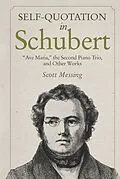Enthusiasts and experts have long relished Schubert's quotations of his own music. This study centers on a previously unidentified pairing: "Ave Maria," one of his most beloved songs, and the Piano Trio no. 2, a masterpiece that holds a unique position in his career. Messing's Self-Quotation in Schubert interrogates the concept of self-quotation from the standpoints of terminology and authorial intent, and it demonstrates, for the first time, how Schubert's practice of self-quotation relates to prevailing practices in the late eighteenth and early nineteenth centuries. Messing goes on to analyze in detail the musical relationships between the two works and to investigate thecircumstances that led Schubert to compose each of them.
"Ave Maria" is one of the few Schubert songs for which we have documentation of some early private performances, and the trio stood at the heart of Schubert's only public concert devoted to his works. Messing establishes that Schubert sought to convey an associative meaning with this self-quotation, trusting in his contemporaries' familiarity with the original melody and with Walter Scott's poem, a text that carried profound resonances in Catholic Vienna. Scrutinizing this evidence yields the symbolic purpose behind Schubert's allusion to "Ave Maria" in the piano trio: honoring the recently deceased Beethoven andvalidating Schubert as his legatee.
SCOTT MESSING is Charles A. Dana Professor of Music Emeritus at Alma College.
Autorentext
Scott Messing is Charles A. Dana Professor of Music at Alma College.
Inhalt
Introduction
Commencements and Contexts
On the Reception of Schubert's Self-Quotations
Two Scores and Their Musical Relationships
Parents and Children: On the Background to "Ave Maria"
From "Ave Maria" to Trio
"Dedicated to nobody, save those who find pleasure in it."
Contexts and Conclusions
